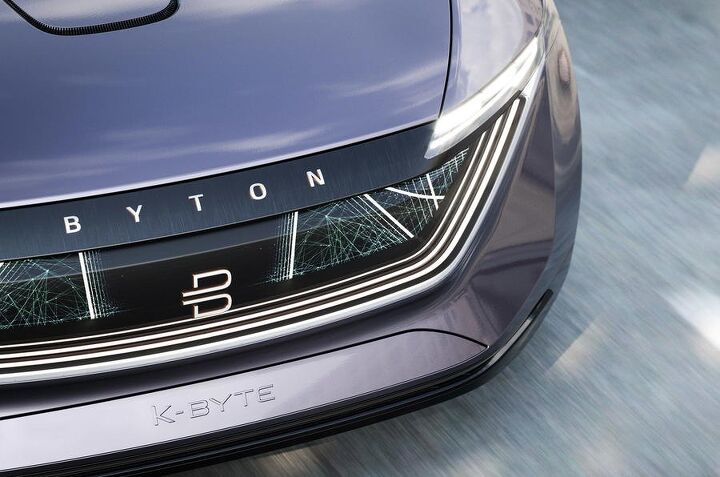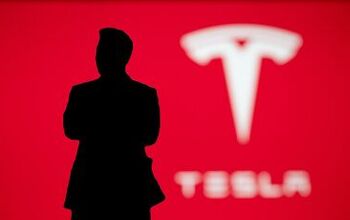Plug Pulled: Byton Suspends Production, Plans Reorganization

Chinese electric car startup Byton will reportedly idle production next month as it attempts to reorganize itself. While the coronavirus emerged as a villain in this play, the issues confronting Byton actually seem pretty dire. The company isn’t just idling factories to address a health crisis, it’s shutting things down for six months while it engages in more fundraising and tries to pay what’s owed to employees.
That’ll be tough with no normal income. Byton has already furloughed a large portion of its staff in California and plans to cease all production in Nanjing. While we knew the PRC’s approach to electrification would ultimately result in countless EV startups going under, we didn’t expect Byton to be among them. Slick products, good marketing, and interesting designs made it seem like it could go the distance — now it seems wholly preoccupied with survival.
Bloomberg, managed to intercept an internal letter to employees explaining the situation this week:
“The new coronavirus epidemic has brought great challenges to Byton’s financing and production operations,” the company said in a statement. “After careful consideration and joint consultations with our shareholders and management, we have decided to, from July 1, kickstart a plan to lower employee costs and promote the company’s strategic reorganization.”
Byton’s relationship with state-owned FAW Group presents another problem. Several years ago, a company with a close relationship with the Chinese government wasn’t deal breaker. That changed after numerous foreign governments decided popular communications entities — like Huawei and Zoom — posed serious national security risks. Having ties to the CCP isn’t doing Chinese businesses any favors these days, at least not in terms of their global marketing efforts.
The manufacturer said it received approval from the State of California late in 2019 to sell its products there and had a working plan to launch the M-Byte electric crossover in Central and Northern Europe for next year. While the EU may still welcome a firm like Byton, the United States seems less apt to cooperate as relations between the two countries continue to worsen. By the time Byton gets its ducks in row, its window into North America may have shut.
Nor have things gone particularly well in China. While we can only speculate on how badly COVID-19 impacted the nation’s industrial sector, we know it’s worse than the government let on. We also know that expectations that Chinese customers would adopt zero-emission vehicles in droves have gone unmet. Despite flooding its own market with EVs, demand for these vehicles started to recede last year. That’s partly the fault of aggressive governmental mandates that confused and spooked would-be customers, but the auto market was already cooling as China’s economy took a turn for the worse — only to be further harmed by the pandemic.
[Image: Byton]

A staunch consumer advocate tracking industry trends and regulation. Before joining TTAC, Matt spent a decade working for marketing and research firms based in NYC. Clients included several of the world’s largest automakers, global tire brands, and aftermarket part suppliers. Dissatisfied with the corporate world and resentful of having to wear suits everyday, he pivoted to writing about cars. Since then, that man has become an ardent supporter of the right-to-repair movement, been interviewed on the auto industry by national radio broadcasts, driven more rental cars than anyone ever should, participated in amateur rallying events, and received the requisite minimum training as sanctioned by the SCCA. Handy with a wrench, Matt grew up surrounded by Detroit auto workers and managed to get a pizza delivery job before he was legally eligible. He later found himself driving box trucks through Manhattan, guaranteeing future sympathy for actual truckers. He continues to conduct research pertaining to the automotive sector as an independent contractor and has since moved back to his native Michigan, closer to where the cars are born. A contrarian, Matt claims to prefer understeer — stating that front and all-wheel drive vehicles cater best to his driving style.
More by Matt Posky
Latest Car Reviews
Read moreLatest Product Reviews
Read moreRecent Comments
- ToolGuy If these guys opened a hotel outside Cincinnati I would go there to sleep, and to dream.
- ToolGuy Michelin's price increases mean that my relationship with them as a customer is not sustainable. 🙁
- Kwik_Shift_Pro4X I wonder if Fiat would pull off old world Italian charm full of well intentioned stereotypes.
- Chelsea I actually used to work for this guy
- SaulTigh Saw my first Cybertruck last weekend. Looked like a kit car...not an even panel to be seen.


































Comments
Join the conversation
That is a bit of a surprise. Yet again, it proves how hard it is to attain stability as a car mfr.